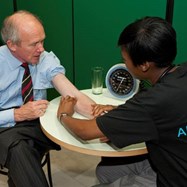The Russell Group supports the Sutton Trust's call for accurate advice for potential students
28 October 2008
Responding to the Sutton Trust report on increasing higher education participation, the Director General of the Russell Group, Dr Wendy Piatt said:
“The Sutton Trust’s report is important in highlighting the significant lack of guidance and career assistance that many school pupils are receiving. It is crucial that all pupils are given accurate information about higher education and the benefits it can bring. It is particularly important that pupils from families who haven’t been to university, or who have less knowledge about higher education than others are given robust support and guidance at school. We are especially concerned by the evidence that some teachers may not be encouraging students to consider Russell Group universities. The Sutton Trust has found that young people from poorer backgrounds were significantly less likely to recognise differences between universities than their better off peers because they had not been informed about the benefits of attending ‘prestigious’ universities. These differences include the fact that students are likely to enjoy higher salaries if they graduate from ‘higher quality’ institutions. To help tackle this problem of lack of advice and guidance, The Russell Group will be holding special conferences next year for teachers and advisors to inform them about all aspects of applying to our universities.
“Our universities are providing a huge array of mentoring and volunteering schemes to raise aspirations, awareness and attainment. Funding devoted by Russell Group universities to outreach programmes has grown by nearly £5m since 2006. This is in addition to the very large sums already committed to outreach from existing budgets. It is important to help tackle the problem of under-achievement and low aspirations from an early age which is why our universities are increasing their links with primary schools.
“This report adds to the robust body of evidence which demonstrates that academic attainment before the age of 18 is the most important factor in whether a student will go on to higher education, not financial considerations. Lack of applications from under-represented groups is one the main difficulties Russell Group universities face in widening participation. Quite simply, Russell Group universities cannot consider applicants who do not apply. “
/end.
Notes to Editors
- A survey from the Sutton Trust found 51% of those educated in state schools believed there is no difference in earnings between higher education institutions, compared with 35% from independent schools. A Sutton Trust report “Primed for Success” called for university candidates to be told that they will enjoy higher salaries if they graduate from "prestigious universities”, citing the 2008 London School of Economics’ Centre for Economic Performance (CEP) report University Quality and Graduate Wages in the UK”. http://www.suttontrust.com/annualreports.asp
- The 2008 CEP report shows that if a student attends an institution in the highest quartile - as determined by a number of different quality measures (RAE scores, retention rates, and tariff scores) – this leads to a higher wage of between 10 and 16 per cent (depending on the measure) compared to an individual who attends an institution in the lowest quartile. Although the report does not identify individual institutions, Russell Group universities achieve high RAE score, retention rates and tariff scores so it is very likely they are in the top quartile of institutions in the UK. “University Quality and Graduate Wages in the UK” Hussain, McNally and Telhaj, Centre for Economic Performance, London School of Economics, 2008.
- A separate Sutton Trust survey found a significant proportion (45%) of teachers either rarely or never encourage their academically-gifted pupils to apply to Oxford or Cambridge.http://www.suttontrust.com/news.asp#a044
-
Hamir Patel
hamir.patel@russellgroup.ac.uk
020 3816 1316
-
Hollie Chandler
Hollie.Chandler@russellgroup.ac.uk
020 3816 1307
 X
X


